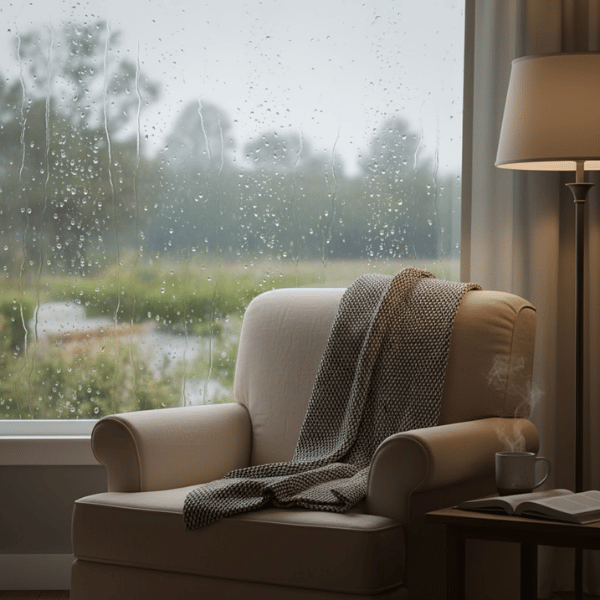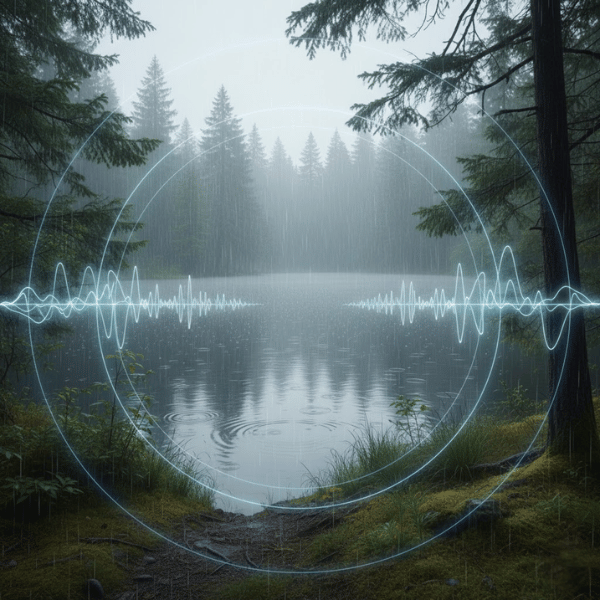Table of Contents
ToggleThe Science of Sleep: Why Your Brain Craves Rain Sounds for Relaxation (1st Part)
Stop Staring at the Ceiling: Discover the Primal Sound Your Brain Craves for Restful Sleep.
The Vicious Cycle of "Trying" to Sleep
It’s 2 AM, and your brain is still awake, racing with thoughts of the day’s stresses. “Why did I say that?” “Will I be able to fall asleep tonight?” Sound familiar? This is a classic case of insomnia, where an overstimulated brain stays trapped in a cycle of stress and sleep issues. Constant fight-or-flight responses keep us from entering a state of rest.

The modern brain is overstimulated. The constant flood of information, endless notifications, and daily stress lock our nervous system into a “fight-or-flight” state. This is your sympathetic nervous system on high alert. It’s designed to keep you awake and ready for danger, and it doesn’t come with an easily accessible “off” switch.
We turn to pills, wine, or just wait to collapse from sheer exhaustion. But these are temporary fixes, often with side effects.
There is, however, a more ancient, instinctive solution. One that’s written into our DNA.
The Alchemy of Sound: Why Rain?
Do you remember falling into a peaceful nap on a rainy afternoon as a child? That wasn’t just by chance. Rain sounds for sleep have a profound neurological and biological effect. Studies show that relaxing rain sounds can lower stress and trigger the brain’s natural relaxation mechanisms.

Here’s the science behind why our brains love the rain.
First: Rain is a Primal Signal of Safety. For our ancestors, a predator’s snap of a twig was a life-or-death alarm. But steady rain changed the rules. It masked those subtle, dangerous sounds. It kept predators in their dens. For early humans, the sound of rain became a powerful, unconscious signal: “It is safe. You can rest. You can lower your guard.” This genetic memory is still with us.
Second: Rain is Nature’s Perfect “Pink Noise.” You’ve heard of “White Noise”—that static ‘shhh’ sound. White noise contains all frequencies at equal intensity, which many people find harsh or artificial.
Pink Noise, however, is different. It’s more balanced and natural, with greater intensity in the lower frequencies. Think of rustling leaves, a steady heartbeat, or a rushing waterfall. And the most classic example? Steady rain.
Pink noise is deeply soothing because it mirrors the familiar, low-frequency rhythms of our own biological systems. It doesn’t just block sound; it feels natural.
The Science of Calm: How "Sound Masking" Works
The real magic of rain for sleep lies in a principle called “Sound Masking.”

Think about this: It’s not the loud noise that wakes you—it’s the sudden change in sound. In a completely silent room, even a small noise like a car horn or creaking floor can pull you out of sleep. This is where sound masking comes in. Rain sound masking works by creating a consistent audio background, making abrupt noises less noticeable and improving your sleep quality.
- It raises the “auditory threshold”: The rain gently fills the audio spectrum, making that baseline level of sound higher.
- It neutralizes sudden noises: That car horn or creak is now “masked” by the existing rain sound. It doesn’t create a sharp, alarming spike. It’s just a small ripple in a big pond.
This acoustic blanket protects your brain from disruptions, allowing it to stay in a deep, restorative sleep cycle without being constantly pulled back to high alert.
Final Note:
In our overstimulated world, stress and constant mental racing make it hard to sleep. However, the sound of rain offers a natural solution. Rain serves as a primal signal of safety, helping the brain shift from a high-alert state to relaxation. As pink noise, it mirrors our body’s rhythms and promotes restful sleep. Additionally, rain sounds act as effective sound masking, blocking out disruptions and allowing deeper, more restorative sleep. Embracing the calming power of rain can guide us into peaceful, rejuvenating slumber, offering both comfort and relaxation.
Frequently Asked Questions (FAQs)
1. Why do rain sounds help me sleep better?
Rain sounds help improve sleep by triggering a neurological response in the brain. The steady, rhythmic sound of rain mimics pink noise, a natural sound pattern with low frequencies that soothe the brain and promote relaxation. This sound masking effect blocks out sudden disruptions, like traffic or creaking floors, which can wake you up during the night.
2. What is the difference between pink noise and white noise?
Pink noise is a type of sound that has a lower frequency than white noise, making it more natural and soothing to the human ear. While white noise contains all frequencies at equal intensity, pink noise is more balanced, with more emphasis on lower frequencies, which makes it feel less harsh and more calming—like the sound of rain, rustling leaves, or a waterfall.
3. How does brainwave entrainment work with rain sounds?
Brainwave entrainment refers to the brain’s ability to synchronize its electrical activity with external rhythms. When you listen to rain sounds or other steady sounds, your brain’s electrical activity moves from the high-alert Beta waves (associated with anxiety and alertness) to more relaxed states like Alpha, Theta, and Delta waves, which are conducive to restful, restorative sleep.
4. Can I use rain sounds to treat insomnia?
Yes, rain sounds can be a helpful tool for managing insomnia. The calming effect of pink noise and sound masking can reduce stress, lower anxiety, and help your brain transition into a relaxed state. It’s especially useful for those who struggle with racing thoughts or are stuck in a constant “fight-or-flight” mode that prevents them from falling asleep.
5. Are all rain sound recordings effective for sleep?
Not all rain sound recordings are created equal. To be truly effective, the sound must be high-quality and free of distracting elements like tinny loops or sudden volume changes. Authentic, high-fidelity binaural rain sounds (like those provided by Aura Drop) create a natural, immersive experience that your brain can believe, helping you relax and sleep more deeply.
Share via: